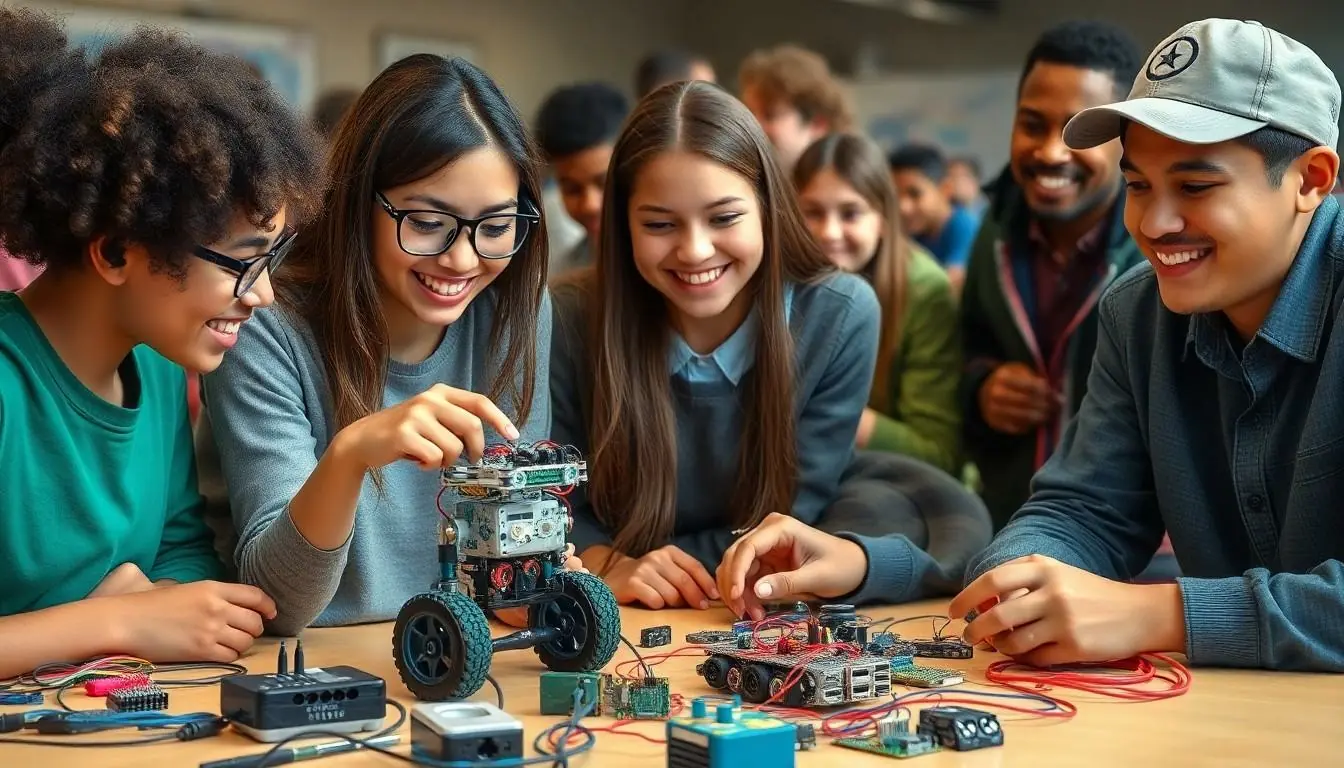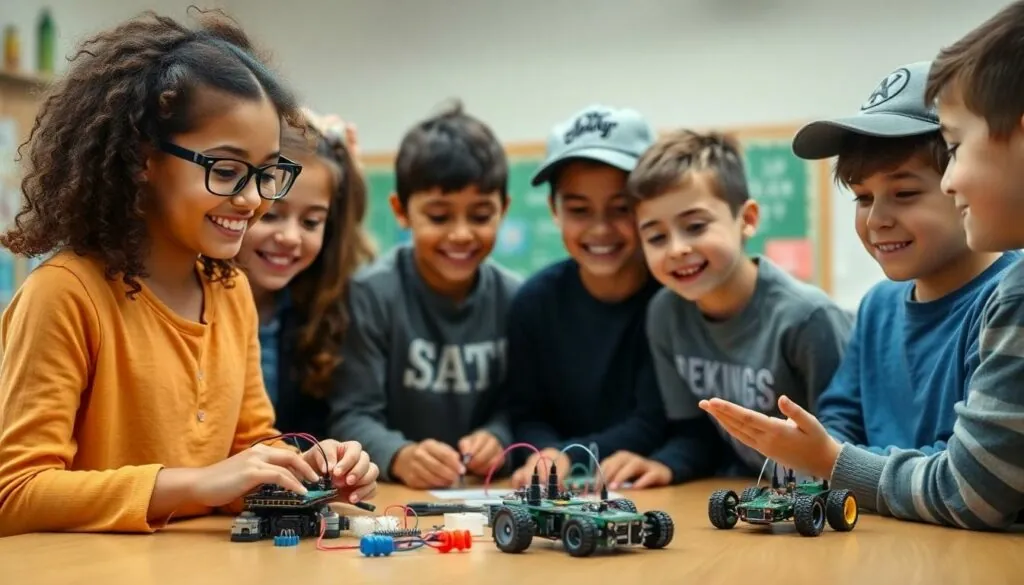Table of Contents
ToggleIn a world where robots are no longer just the stuff of sci-fi movies, mentee robotics is stepping into the spotlight, and it’s about time. Imagine a future where budding engineers and tech enthusiasts can learn the ropes of robotics in a fun and engaging way. This isn’t just about building cool gadgets; it’s about fostering creativity, critical thinking, and maybe even a little bit of friendly competition.
What Is Mentee Robotics?
Mentee robotics refers to an innovative educational approach that teaches aspiring engineers and tech enthusiasts the principles of robotics. This method emphasizes learning through engagement, allowing participants to design and program robots in a fun, interactive environment. By fostering creativity, mentee robotics promotes critical thinking skills essential for future careers in technology.
Participants engage in hands-on projects where they build and control robotic systems. This experiential learning approach encourages teamwork and collaboration, enhancing problem-solving capabilities. Through friendly competition, learners enjoy the process while honing their technical skills.
Mentee robotics programs often incorporate various platforms and tools, such as Arduino or Raspberry Pi, which provide a solid foundation for understanding robotics concepts. Workshops and classes frequently focus on specific themes, such as automation or artificial intelligence, allowing participants to explore diverse aspects of the field.
The inclusive nature of mentee robotics attracts individuals of different skill levels, from beginners to seasoned coders. Experienced mentors guide learners through challenges, offering support and resources to bolster their learning journey. As a result, mentee robotics nurtures a community of future innovators capable of tackling real-world problems.
Key Features of Mentee Robotics

Mentee robotics incorporates numerous features that enhance the learning experience for aspiring engineers and tech enthusiasts.
User-Friendly Interface
A user-friendly interface simplifies the learning process, allowing users to navigate easily through various functionalities. This intuitive design caters to individuals with varying skill levels, ensuring that everyone can engage effectively with the program. Tools and features present on the platform facilitate seamless interaction, promoting experimentation and creativity. Additionally, visual programming environments often accompany the interface, enabling users to grasp complex concepts quickly without needing deep coding knowledge.
Educational Benefits
Educational benefits of mentee robotics extend beyond traditional learning environments. Participants actively develop problem-solving skills while collaborating with peers and mentors. Interacting with robotics fosters critical thinking, enabling learners to tackle real-world challenges innovatively. Engaging in hands-on projects nurtures creativity, helping students connect theoretical knowledge to practical applications. Notably, exposure to platforms like Arduino and Raspberry Pi sparks interest in automation and artificial intelligence, preparing learners for future technology-driven careers.
Applications of Mentee Robotics
Mentee robotics finds numerous applications across various sectors, enriching the learning experiences of students and participants.
In Schools
Schools leverage mentee robotics to enhance science, technology, engineering, and mathematics (STEM) education. Students engage in hands-on projects that demonstrate theoretical principles in a practical environment. Collaborating on robotics builds teamwork skills and fosters creativity among peers. Many schools implement robotics clubs or classes, using platforms like Arduino and Raspberry Pi. These programs often align with curriculum standards and encourage critical thinking. Robotics projects challenge students to solve real-world problems, making learning relevant and engaging. Teachers frequently serve as facilitators, guiding students as they navigate complex tasks.
In Extracurricular Programs
Extracurricular programs capitalize on mentee robotics to attract students with various interests. Workshops and competitions stimulate enthusiasm for technology outside the classroom. Participation in robotics challenges promotes camaraderie among students, creating an inclusive learning environment. Many organizations establish after-school programs focusing on coding, robotics, and automation, ensuring all skill levels are accommodated. Mentors play a vital role, offering expertise and support as participants explore new technologies. Exposure to robotics in these settings cultivates a passion for innovation, preparing students for future careers in technology. These initiatives empower students to become confident problem solvers.
Challenges and Limitations
Mentee robotics faces several challenges that can impact its effectiveness. Addressing these issues is crucial for optimizing the learning experience for all participants.
Technical Barriers
Technical barriers often hinder the smooth implementation of mentee robotics programs. Limited access to advanced technology can create disparities among participants. Inadequate internet connectivity restricts online resources critical for learning. Some beginners may struggle with understanding complex programming concepts, especially when using sophisticated platforms. Encouraging a collaborative environment where participants support each other can mitigate these obstacles. Additional workshops focusing on foundational skills would benefit learners, equipping them with essential knowledge before diving into advanced topics.
Accessibility Issues
Accessibility issues represent a significant hurdle in mentee robotics. Not all students have equal access to robotics kits and resources, potentially limiting participation. Financial constraints may prevent individuals from acquiring necessary materials and technology. Encouraging schools to invest in inclusive programs ensures all students have opportunities to engage with robotics. Consequently, mentorship programs can establish partnerships with local organizations to provide resources at little to no cost. Tailoring initiatives to cater to diverse needs bolsters the overall success and reach of mentee robotics, fostering a more equitable learning environment.
Mentee robotics stands as a transformative approach to education in the tech field. By combining hands-on learning with mentorship, it cultivates a new generation of innovators. Participants not only gain technical skills but also learn the importance of collaboration and creative problem-solving.
The interactive nature of these programs fosters a love for technology while preparing learners for future challenges. As mentee robotics continues to evolve, its impact on STEM education and beyond will likely grow. Embracing this innovative methodology can bridge gaps in accessibility and inspire countless individuals to explore the world of robotics.




